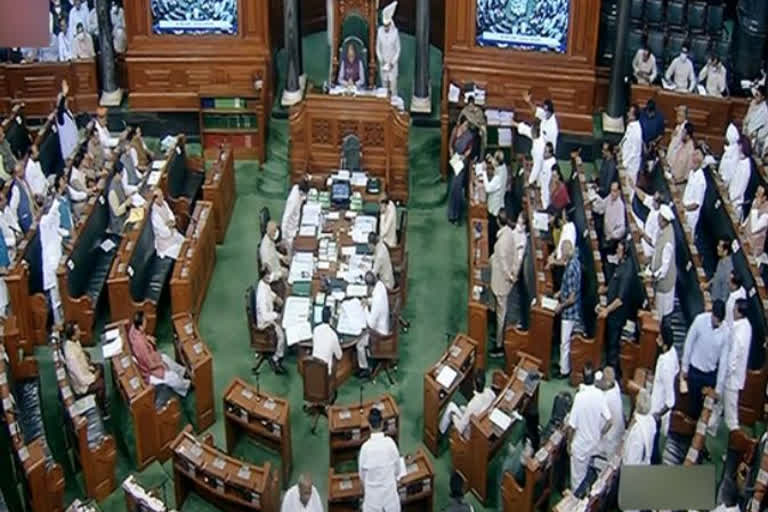New Delhi : Lok Sabha and Rajya Sabha faced disruptions due to protests by opposition members on various issues with the two Houses passing a bill each on the 13th day of the Monsoon Session of the Parliament. The government withdrew the Personal Data Protection Bill, 2019 to come up with more comprehensive legislation. The Central Universities (Amendment) Bill, 2022 was passed by the Lok Sabha and National Anti-Doping Bill by the Rajya Sabha.The Opposition parties protested in the two Houses alleging "misuse" of central probe agencies by the government.
The Lok Sabha was adjourned till 12 noon, 2 pm, 4 pm before it was adjourned for the day after Central Universities (Amendment), Bill 2022 bill was passed. Earlier, Union Minister of Power and Renewable Energy RK Singh introduced the Energy Conservation (Amendment) Bill, 2022 in Lok Sabha. He said it will help reduce India's reliance on foreign countries for large quantities of natural gas and petroleum. This Bill will benefit the environment and reduce carbon dioxide emissions, he said.
Union Electronics and Information Technology Minister Ashwini Vaishnaw moved the motion for withdrawal of the Data Protection Bill in Lok Sabha. "The Data Protection Bill 2021 as reported by the Joint Committee may be withdrawn," he said. The House adopted the motion. The minister later said that Personal Data Protection Bill, 2019 was deliberated in great detail by the Joint Committee of Parliament and 81 amendments were proposed and 12 recommendations were made towards a comprehensive legal framework on the digital ecosystem.
Also Read-India has 2 pc share in global space economy: Govt tells Parliament
The 2019 bill sought to bring a strong and robust data protection framework for India and to set up an Authority for protecting personal data and empowering the citizens' with rights relating to their personal data ensuring their fundamental right to "privacy and protection of personal data". The bill was sent to a Joint Committee of Parliament which gave its report on December 16, 2021.
Replying to the debate Central Universities (Amendment), Bill 2022, Union Minister for Education and Skill Development Dharmendra Pradhan said that Prime Minister Narendra Modi always works with a vision for the future and under his leadership, a future-ready workforce to embrace the fourth industrial revolution and challenges of the 21st century is being prepared. He also spoke about steps being taken for India to be self-reliant in frontier technologies.
The bill seeks to amend Central Universities Act, 2009, which was enacted to establish and incorporate universities for teaching and research in various states. It seeks to convert the National Rail and Transportation University, a deemed university, into Gati Shakti Vishwavidyalaya, an autonomous Central University under the administrative control of the Ministry of Railways.
The National Rail and Transportation University is located in Vadodara. Pradhan said Gati Shakti Vishwavidyalaya will address the need of talent in the strategically important and expanding transportation sector and meet the demand for trained talent to fuel the growth and expansion of the sector. The scope of the proposed University will also extend beyond the railways to cover the entire transport sector to support the ambitious growth and modernisation of the sector. The Rajya Sabha passed the National Anti-Doping Bill, 2021 unanimously by a voice vote.
Opposition parties also took part in the discussion on the bill which seeks to provide a statutory framework for the functioning of the National Anti-Doping Agency (NADA) and the National Dope Testing Laboratory in sports. The Bill was passed by the Lok Sabha on July 27. Replying to the debate on the bill, Minister of Youth Affairs and Sports Anurag Thakur said India will now join the league of nations like the US, China, France or Australia, Japan, S Korea to have a law and dope test laboratory.
The bill provides for planning, implementing, and monitoring anti-doping activities as well as investigating anti-doping rule violations. It also seeks to give effect to the United Nations Educational, Scientific and Cultural Organisation International Convention against doping in sports and compliance with such other obligations and commitments. The legislation prohibits athletes, athlete support personnel, and other persons from engaging in doping in sports. The Bill proposes to establish the National Board for Anti-Doping in Sports with a view to make recommendations to the government on anti-doping regulations and compliance with international commitments on anti-doping. The board will oversee the activities of NADA and issue directions to it.
In her maiden speech, nominated Rajya Sabha member PT Usha said a high number of doping cases in India is a serious concern and this needs to be addressed. "We are yet to open our eyes to doping abuse in our country. What was once confined only to the senior national levels has now reached junior, college, and school levels too," she said. CPI (M) MP John Brittas said budgetary allocation for sports should be increased. "You should be using your political clout to increase the budgetary allocation to sports in India," he said, addressing Thakur. The Monsoon Session convened on July 18 and will conclude on August 12. (ANI)



